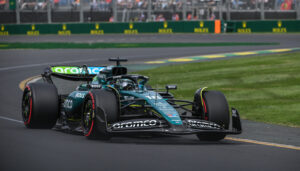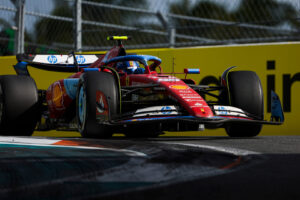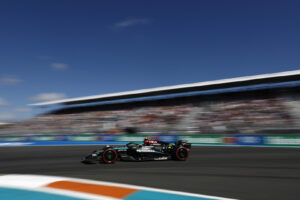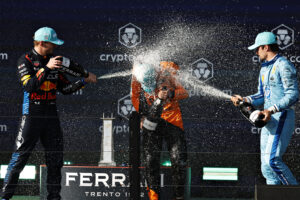Like many other race tracks in 2020, Drew Bedard’s plans for Bristol Motor Speedway hit a speedbump with the COVID-19 pandemic.
The Food City 500, originally scheduled for mid April, was pushed to late May and ran without fans in attendance.
Then, with restrictions on events in North Carolina, the NASCAR All-Star Race moved from its traditional home at Charlotte Motor Speedway to Bristol in mid July.
Bedard and his team had just four weeks to prepare an advertising campaign.
“Becky (Cox, head of public relations at Bristol) and I and other team members,” he said, “we quickly get in a room. We quickly figure out what are the goals? What are the objectives? How many tickets do we have to sell in a COVID year? What is our safe capacity? Then we quickly create a budget for the marketing and advertising side. We quickly created a budget.
“Then how do we be smart about the spend to hopefully sell our products effectively? And how do we message it? And also balancing the fact that safety was just as important as the sort of fun factor. People were just as interested in getting out, having a good time as they were to go to a very safe event.”
He didn’t do all the heavy-lifting, however. With the All-Star Race being a NASCAR-led endeavor, he worked with the sanctioning body to promote the event.
This is a small taste of what goes into marketing a NASCAR race weekend at Bristol.
Advertising a race weekend at Bristol
Whether it’s TV, the internet, radio or the Interstate, advertisements are a ubiquitous part of American life.
But how many people stop and think about the inner machinations of these ads and what goes into making them? Chances are that most don’t.
Bedard, however, is one who does.
As the vice president of marketing for Bristol, he’s in charge of crafting the advertising campaigns that influence people to spend their discretionary income on tickets to “Thunder Valley.”
How much money Bedard spends on advertising fluctuates from year-to-year and event-to-event.
“We literally do an equation that says, ‘How many units do we have to sell,’” he said. “Then to sell those units, and this is kind of the same process that Becky might go through on the communication side, too. For us to get together and to sell those units that are out there that usually ends up an equation of we think we need to spend X amount of dollars to reach the amount of people to be able to sell a certain amount of tickets.”
The process
Bedard starts the creative process six months before Bristol’s next race weekend. At this point, it’s nothing more than “a skeleton or a shell.” Roughly three months before, it “gets crystallized.”
“Here are the creative looks,” he said. “Here’s the mood board. Yeah, here’s the creative looks. Here’s the copy and then we send that for approval.”
Once approved, he and his team make the advertisements that run on TV and radio in the leadup to a NASCAR weekend at the “Last Great Colosseum.”
Along with his team and the public relations team at Bristol, Bedard works with the corporate team at Charlotte — headquarters of parent company, Speedway Motorsports Inc. — to coordinate and implement the track’s marketing campaigns.
“There’s almost like a marketing consortium,” he said. “There’s me and three or four other Speedway Motorsports marketing leads that will vet creative.”
Case in point, after the NASCAR All-Star Race in July, he and teammate Carissa King laid out their plan for September’s Bass Pro Shops NRA Night Race on a conference call with SMI marketing heads.
“So that marketing lead team really was able to bring up questions and ideas,” he said. “Kind of shoot holes in it, that helped us to finalize what the creative was going to be. So that we could then get it done and commercials and print creative, outdoor creative, digital, whatever it may be.”
Billboards
He doesn’t just spend money on TV, radio and internet ads. He also puts heavy emphasis on billboards.
Bedard focuses the most on the home market, with billboard ads all over Tri-Cities, Tennessee/Virginia.
He also buys billboard ads in other markets, like Knoxville, Tennessee.
But he’s not limited to Tennessee and Virginia. Bristol buys ads in multiple cities in North Carolina and South Carolina.
“We used to buy some outdoor (ads) in Lexington and Louisville (Kentucky),” he said. “We used to buy more, maybe even South of Charlotte, but I would say that it’s concentrated a little bit more. So I would say in recent years, the farthest away that we’ve bought is Nashville (Tennessee).”
Other events
Of course, Bristol hosts more than just NASCAR races. It holds monster truck shows, late model races — such as the Short Track Nationals — and NHRA events at nearby Bristol Dragway. While the budget for NHRA events is half of what Bedard spends on NASCAR, it’s much tighter for monster truck shows and late model races.
“It’s more of a blitz format,” he said. “So it’s like a two to two and a half week advertising window where we just sort of throttle up all the messaging right near the event. Whereas NASCAR might take place six, eight weeks out from an event.”
He found that this approach works better for the smaller events like monster truck shows and late model races than a traditional one.
“So actually the last few times that we’ve done advertising spends,” he said, “we do a heavy amount right at the beginning and then sort of ramp downward toward the event.”
So what have we learned, today, class? There’s a bit of a science that goes into advertising. And it’s no different when it comes to a NASCAR weekend at Bristol.
EDITOR’S NOTE: Tucker White originally wrote this story for a college course he took at the University of Tennessee. He uploaded it here to fulfill the requirements of another assignment of that same course.
TOP IMAGE: Jared C. Tilton/Getty Images






